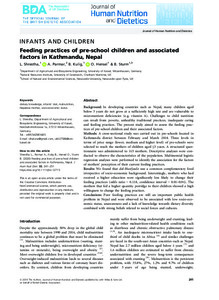Feeding practices of pre‐school children and associated factors in Kathmandu, Nepal
| dc.date.accessioned | 2020-03-16T16:43:30Z | |
| dc.date.available | 2020-03-16T16:43:30Z | |
| dc.date.issued | 2019-11-03 | |
| dc.identifier | doi:10.17170/kobra-202003161078 | |
| dc.identifier.uri | http://hdl.handle.net/123456789/11486 | |
| dc.description.sponsorship | Gefördert im Rahmen des Projekts DEAL | |
| dc.language.iso | eng | eng |
| dc.rights | Namensnennung - Nicht-kommerziell - Weitergabe unter gleichen Bedingungen 4.0 International | * |
| dc.rights.uri | http://creativecommons.org/licenses/by-nc-sa/4.0/ | * |
| dc.subject | dietary knowledge | eng |
| dc.subject | infants´ diet | eng |
| dc.subject | malnutrition | eng |
| dc.subject | Nepalese mother | eng |
| dc.subject | socio-economic status | eng |
| dc.subject.ddc | 300 | |
| dc.title | Feeding practices of pre‐school children and associated factors in Kathmandu, Nepal | eng |
| dc.type | Aufsatz | |
| dcterms.abstract | Background In developing countries such as Nepal, many children aged below 3 years do not grow at a sufficiently high rate and are vulnerable to micronutrient deficiencies (e.g. vitamin A). Challenges to child nutrition can result from poverty, unhealthy traditional practices, inadequate caring and feeding practices. The present study aimed to assess the feeding practices of pre‐school children and their associated factors. Methods A cross‐sectional study was carried out in pre‐schools located in Kathmandu district between February and March 2018. Three levels in terms of price range (lower, medium and higher level) of pre‐schools were selected to reach the mothers of children aged ≤3 years. A structured questionnaire was administered to 145 mothers. Descriptive analyses were conducted to observe the characteristics of the population. Multinomial logistic regression analyses were performed to identify the association for the factors of mothers’ perception of their current feeding practices. Results We found that dal‐bhat/jaulo was a common complementary food irrespective of socio‐economic background. Interestingly, mothers who had received a higher education were significantly less likely to change their feeding practices (odds ratio = 0.118, confidence interval = 0.01–0.94). The mothers that fed a higher quantity porridge to their children showed a high willingness to change the feeding practices. Conclusions Poor feeding practices are still an important public health problem in Nepal and were observed to be associated with low socio‐economic status, unawareness and a lack of knowledge towards dietary diversity combined with strong beliefs related to social forces and cultures. | eng |
| dcterms.accessRights | open access | |
| dcterms.creator | Shrestha, Luna | |
| dcterms.creator | Parmar, Aditya | |
| dcterms.creator | Kulig, Boris | |
| dcterms.creator | Hensel, Oliver | |
| dcterms.creator | Sturm, Barbara | |
| dc.relation.doi | doi:10.1111/jhn.12715 | |
| dc.type.version | publishedVersion | |
| dcterms.source.identifier | ISSN 1365-277X | |
| dcterms.source.issue | Issue 2 | |
| dcterms.source.journal | Journal of human nutrition and dietetics | eng |
| dcterms.source.pageinfo | 241-251 | |
| dcterms.source.volume | Volume 33 | |
| kup.iskup | false |
Dateien zu dieser Ressource
Das Dokument erscheint in:
-
Artikel [1106]


